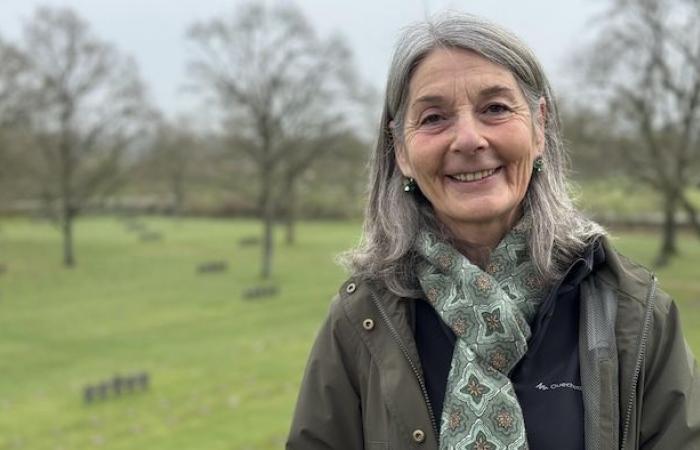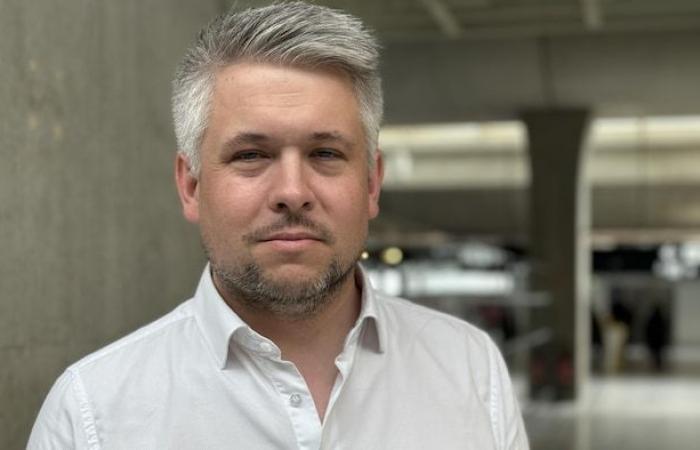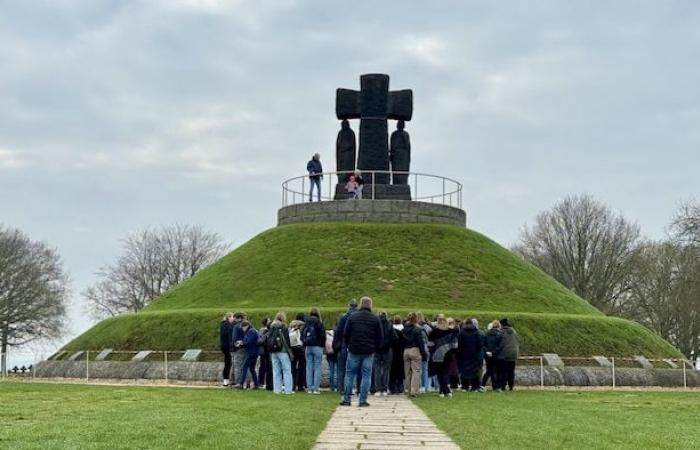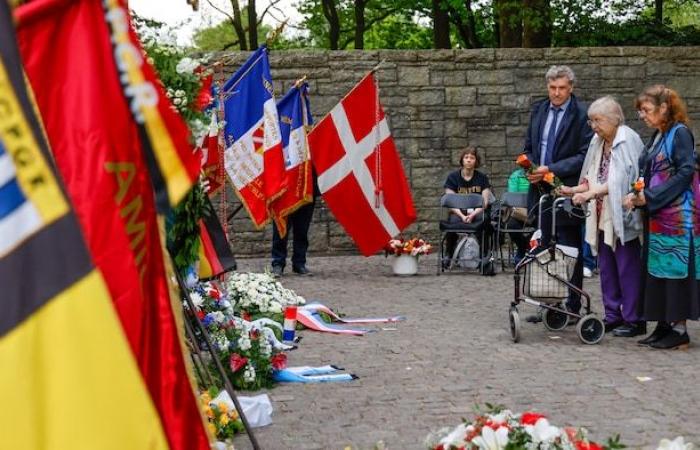“This cemetery is melancholy, dark,” describes the conservative of the premises, Marie-Annick Wieder.
Located about fifteen kilometers from the American cemetery in Colleville-sur-Mer, in Normandy, the German military cemetery of the Cambe houses bodies with more than 21,000 soldiers who fought under the orders of the Third Reich during the Second world War.
Some soldiers have perpetrated massacres, but soldiers also fought against their will
specifies Ms. Wieder, the site manager for the Volksbund organization, head of maintaining the burials of German war victims in the world.
After the inauguration of the site in 1961, visitors came in secret because it was too close to the end of the war
says the curator.
I have a 93 -year -old resident to whom we must not talk about the Germans
says Bernard Lenice, mayor of the municipality of the Cambe, which welcomes this cemetery.

Open in full screen
Marie-Annick Wieder is the curator of the German military cemetery of the CAMBE.
Photo: Radio-Canada / Raphaël Bouvier-Auclair
Over time, the presence of these burials was accepted by the community. Over 450,000 visitors stop there every year. The cemetery has ultimately become an essential place
Constate Men weather.
German visitors, long discreet, are also increasingly present on the site.
What does the Germans represent? Liberation or defeat? But the common point, in the end, is peace.
Between memory exercise and historical guilt
The specialist in the Second World War Valentin Schneider was born in Germany, but he was a child when his family moved to Normandy, where the history of this conflict is omnipresent.
The history of the Second World War in our family was not a subject
he recalls.
class comrades wanted to know where my grandfathers had fought. I had no idea. I had to get home and I was starting to ask questions
says the expert.
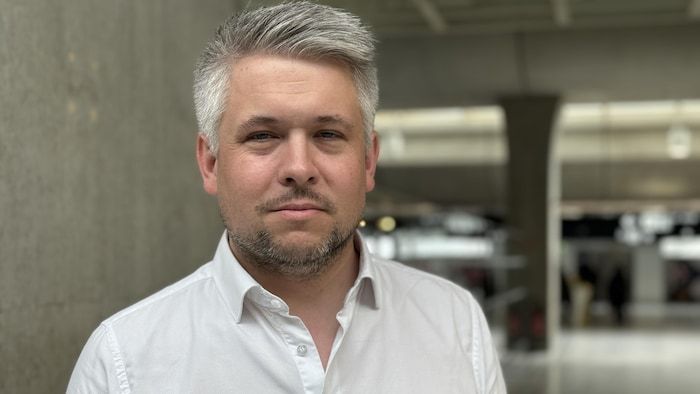
Open in full screen
Historian Valentin Schneider was born in Germany, but grew up in Normandy, in France.
Photo: Radio-Canada / Raphaël Bouvier-Auclair
However, Mr. Schneider explains that in Germany This feeling of embarrassment in relation to history remains preponderant
.
Given the role played by Berlin during the Second World War, the country’s leaders are discreet during major international ceremonies that mark the Normandy landing or the end of the conflict.
In 1985, US President Ronald Reagan went to the German military cemetery in Bitburg with Chancellor Helmut Kohl, in order to score German-American reconciliation.
The presence of remains of SS (Military Police of the Nazi regime) on the site has raised an uproar.
This marked the end of German commemorations on German military cemeteries, at the level of state leaders
explains Mr. Schneider. Other places still host official ceremonies in early May, for example, former concentration camps released by the Allies in 1945.
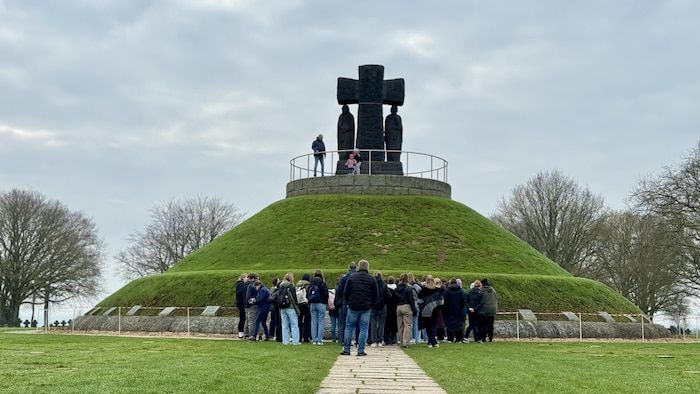
Open in full screen
About 450,000 visitors stop at the German military cemetery in La Cambe, in France each year.
Photo: Radio-Canada / Raphaël Bouvier-Auclair
Eighty years after the end of the conflict, the historian, associated with the Hellenic National Research Foundation, notes that the prospects are starting to change.
There is a fatigue of this feeling of guilt and it is something on which the extreme right capitalizes.
The expert gives the example of Bjorn Hocke, manager for the Thuringia for AFD, Alternative Für Deutschland.
In a 2017 speech, he said that Germany was the only country to have erected a Shame monument
In his capital, referring to the monument of the Holocaust in Berlin.
The far -right politician called his country to make a 180 degree turn
on its memory policy.
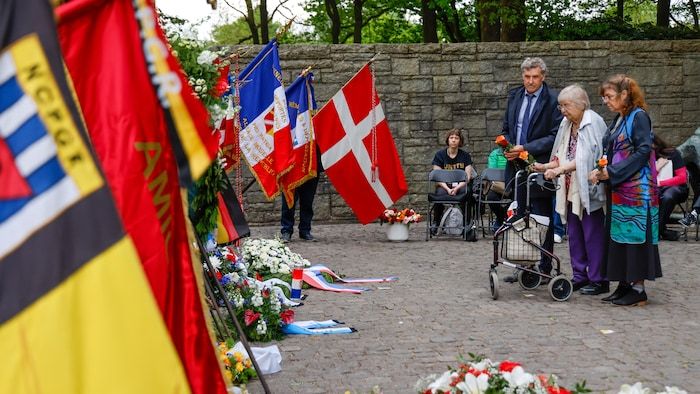
Open in full screen
The survivor of the Holocaust Helga Melmed participates in a ceremony marking the 80th anniversary of the release of the Neuegamme camp in Germany.
Photo : afp via getty images / FOCKE STRANGMANN
From nostalgia
In the military cemetery of the Cambe, in Normandy, management is sometimes even confronted with the nostalgia for the Third Reich.
In the early morning, employees sometimes have to clean SS officers on which fanatics
came to drop objects overnight.
The stele of Michael Wittman, a chariot head raised to the rank of heroes by Nazi propaganda, has even been stolen a few times.
Germany in front of a disturbing past
ENGINE MAI FIRSTAll terrain

Launch listening| 10 min
But the vast majority of hundreds of thousands of site visitors do not stop there for tributes.
I had a class whose students had refused to get off the bus when they learned that waffen-ss were buried
recalls the conservative of the cemetery.
We don’t come to celebrate. In the end, it brought us democracy. But it’s been 80 years. After 80 years, there are no longer many people attached at that time.
Thomas, a German visitor met in the Cambe cemetery, wanted to stop there.
When you visit the landing beaches, everything is British, American or Canadian. You don’t see anything German, except for a few bunkers. There is a breach because they were also there
he believes.
His visit is a way of having a more complete portrait of the story, as dark as it is.

